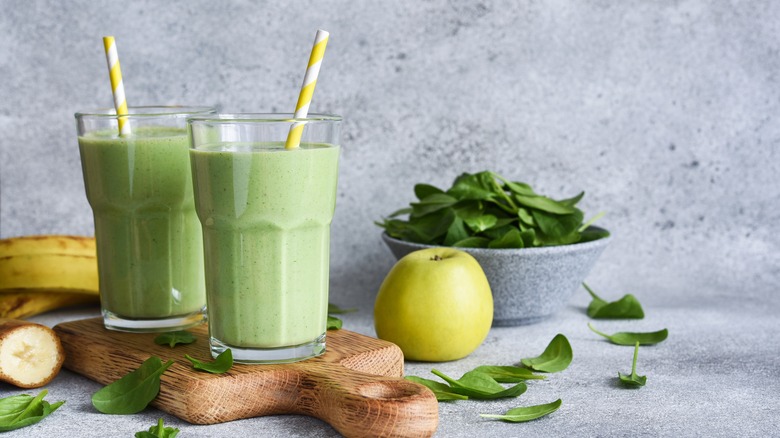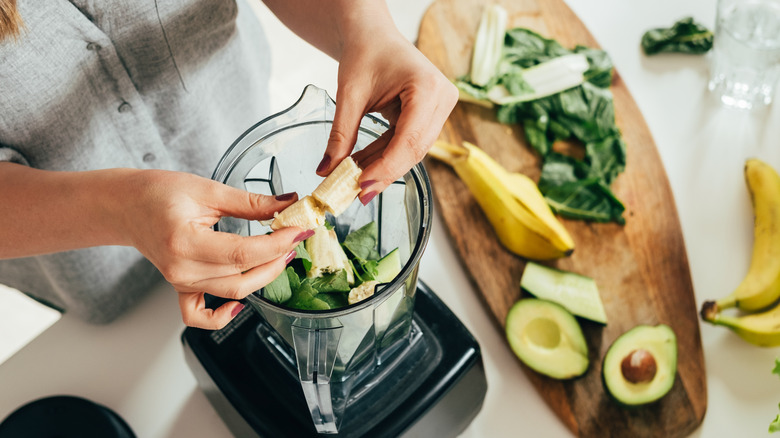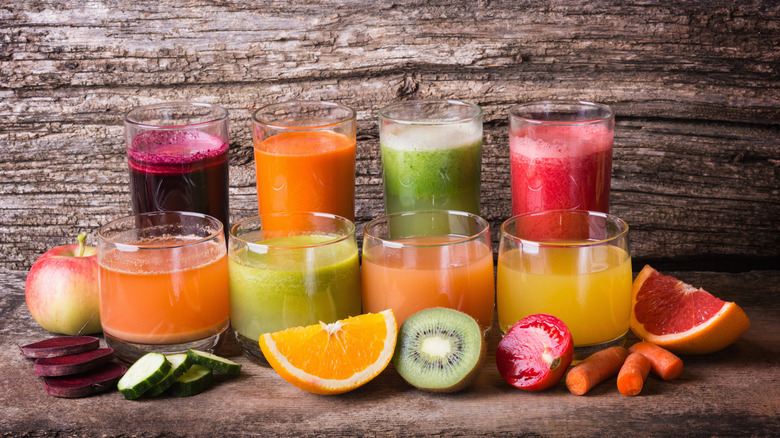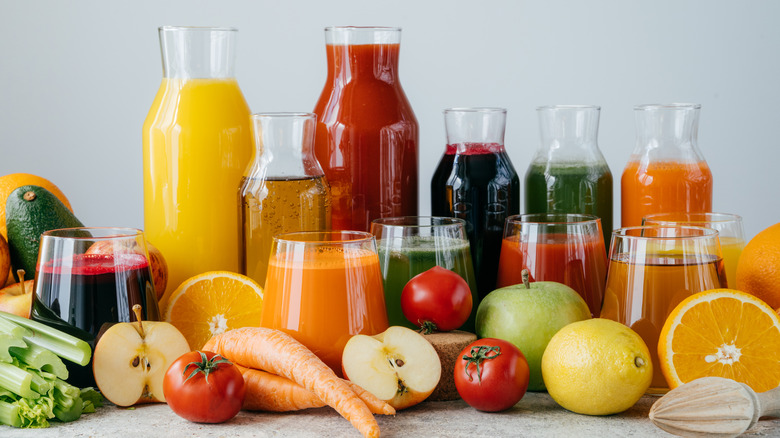Smoothies Vs. Juice: Is There A Nutritional Difference?
Most of us are constantly looking for ways to improve our lives. We try to buy organic produce or swallow some chewy vitamins on the way to work and generally try to find ways to keep our eyes sharp and our skin clear on the day-to-day. Besides going on long walks to clear the head and drinking more water, many have started drinking smoothies to boost their energy and ingest some fruits and veggies.
You've probably heard of places like Jamba Juice or other brands that make various kinds of smoothies and juices for a variety of different taste buds and health needs. These places supply veggie and fruit-packed drinks for their customers and are highly customizable, but when it comes to choosing what's right for you and your needs, things can become tricky when deciding between a juice boost or a hearty smoothie. So, before you pull out your phone and order yourself a mango-banana smoothie or a crisp and gingery green juice, read up on the nutritional difference between smoothies and juices because while they are often made from the same items, they are not the same thing.
Smoothie benefits
Whether you prefer the fresh taste of greens like kale or spinach, or you enjoy the sweeter side of produce like strawberries and kiwi, smoothies can do it all while retaining beautiful color and texture from the blend of ingredients. Making you feel full and refreshed is just one part of the smoothie's benefits. By definition, Healthline says that smoothies are remarkably diverse and can be made using fruits, vegetables, yogurt, and even nuts and seeds! Smoothies can be pureed fresh or frozen, and because of the vast array of agricultural ingredients they can contain, they are a fantastic source of bodily necessities like vitamins, minerals, fiber, fats, protein, and antioxidants. This is beneficial because, according to the Centers for Disease Control and Prevention, adults should consume at least 1 ½ cups of fruit a day and 2 cups of vegetables or more! Unfortunately, many of us are terrible at meeting that mark, but drinking smoothies is a great way to get the nutrition you need if you have a hard time eating fruits and veggies alone.
The Spine and Pain Clinics in North America tell us that smoothies have the added benefit of fiber. Fiber is imperative to your digestive system and helps to keep diseases from developing, and you can get what you need daily if you drink smoothies with ingredients like raspberries, blackberries, strawberries, pears, apples, bananas, flaxseed, almond/peanut butter, and much more; all of which are very common in smoothies.
Juice benefits
Juice on the other hand is made a bit differently. Juice is extracted from fresh fruits and vegetables. This is done using a juicer, which separates the solid aspects of the food from the liquid. The Mayo Clinic claims that though juicing has become quite popular over the years, it is not any healthier than simply eating whole fruits and vegetables, though, like the smoothie, it might make consuming them more convenient for you. Juicing does pass on much of the beneficial vitamins, minerals, and other phytonutrients, but unfortunately, by removing the solid matter from what you're consuming, the fiber is completely stripped, though some argue that removing the fiber helps your body to absorb the nutrients more rapidly.
According to Food Network, this claim isn't entirely true, and by removing fiber totally from fruits and vegetables, you are reducing the digestive and disease-prevention properties fresh produce provides the body. In addition, to get a single serving of juice, you must use significantly more fruits and veggies than you would for a single serving of a smoothie which means you'll be consuming more vitamins but also more sugar and calories.
The biggest nutritional differences
Here's the deal: Consuming more fruits and veggies will ultimately benefit your overall health, and both juicing and smoothies provide that. There are just a few notable differences between the two substances that simply provide the drinker with different benefits. Eating Well states that smoothies contain all that lovely dietary fiber the body needs to succeed. Gut bacteria thrive on fiber and can help to soothe stomach issues and, depending on the ingredients you add, yogurt and nut butter also provide protein and probiotics to your diet, which plain juice does not.
Splendid Spoon confirms that at the end of the day, juicing sucks water and nutrients from produce (which are good for you) but neglects fiber while smoothies provide all the components of the fruits and vegetables used. Both drinks are hydrating and nourishing, and if you're getting plenty of fiber and protein from your solid food diet, juicing is perfectly acceptable, but if you're looking for a beverage that packs a lot more dietary nutrition, smoothies are the way to go!



